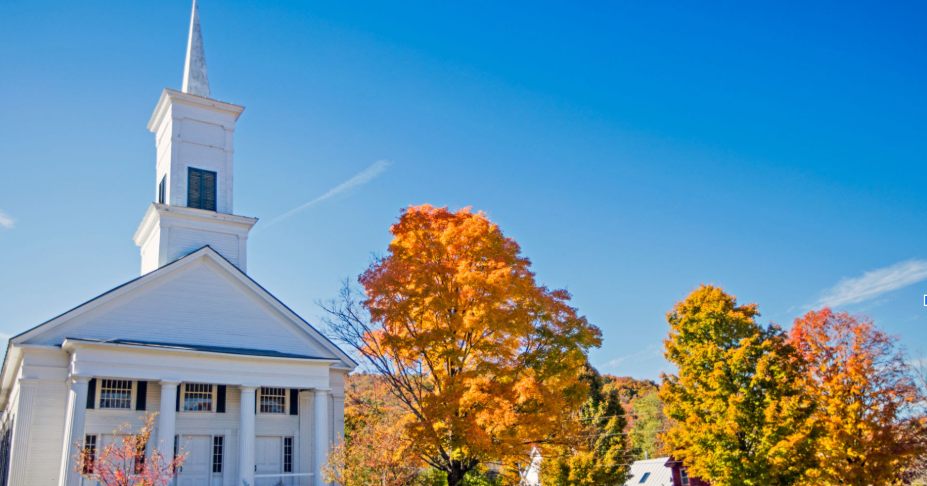Our Denomination
The United Church of Christ came into being in 1957 with the union of two Protestant churches or “denominations.” They were the Evangelical and Reformed Church and the Congregational Christian Churches. The Congregational Churches were organized when the Pilgrims of Plymouth Plantation (1620) and the Puritans of the Massachusetts Bay Colony (1629) acknowledged their essential unity in the Cambridge Platform of 1648. The Reformed Church in the United States traced its beginnings to congregations of German settlers in Pennsylvania founded from 1725 on. Later, its ranks were swelled by Reformed immigrants from Switzerland, Hungary and other countries. The Christian Churches sprang up in the late 1700s and early 1800s in reaction to the theological and organizational rigidity of the Methodist, Presbyterian and Baptist churches of the time. The Evangelical Synod of North America traced its beginnings to an association of German Evangelical pastors founded in 1841 in Missouri. The Synod reflected the values of a union in 1817 between Lutheran and Reformed churches in Germany.1
Through these churches, roots are deep in the reform movements of the American frontier and the Swiss, German, and English Reformations and also penetrate beyond the sixteenth century to the Latin church of the West and to the early church that once knew a remarkable degree of unity throughout the Roman Empire. In matters of worship, and all other matters, the United Church of Christ is the inheritor of this history with all its splendor and shame and is responsible for appropriating now the great lessons this history is able to teach. Religious history in the United States of America affirms that the United Church of Christ is a church of European origins. It is also a church of Black, American Indian, Hispanic, Asian American, and other people who share one diverse household of faith that makes the United Church of Christ a humble microcosm of the church throughout the world. It is also a church of women and men, ordained people and lay people, single people and married people, children and youth and adults, rich and poor, people with few disabling conditions and those with more. The United Church of Christ is local churches, associations, conferences, instrumentalities, and the General Synod.
At the same time, the United Church of Christ claims its place in the one, holy, catholic, and apostolic church of Jesus Christ which is the home of all Christians. It strives to participate responsibly in the ecumenical movement. The United Church of Christ is not only these things. It is also becoming.2 In recent years, members of other traditions including Roman Catholic, evangelical and Pentecostal Christians have found a new home in the UCC, and so have LGBTQ Christians who have been rejected by other churches. The United Church of Christ celebrates and continues to embrace a broad variety of traditions in its common life.
After the United Church of Christ was organized, it adopted a new Statement of Faith. We at Community Protestant Church affirm this Statement of Faith, and say it regularly in our worship service, along with the Apostles’ Creed and our church covenant. The UCC Statement of Faith is as follows:
We believe in God, the Eternal Spirit, who is made known to us in Jesus our brother, and to whose deeds we testify:
God calls the worlds into being, creates humankind in the divine image, and sets before us the ways of life and death.
God seeks in holy love to save all people from aimlessness and sin.
God judges all humanity and all nations by that will of righteousness declared through prophets and apostles.
In Jesus Christ, the man of Nazareth, our crucified and risen Lord, God has come to us and shared our common lot, conquering sin and death and reconciling the whole creation to its Creator.
God bestows upon us the Holy Spirit, creating and renewing the church of Jesus Christ, binding in covenant faithful people of all ages, tongues, and races.
God calls us into the church to accept the cost and joy of discipleship, to be servants in the service of the whole human family, to proclaim the gospel to all the world and resist the powers of evil, to share in Christ’s baptism and eat at his table, to join him in his passion and victory.
God promises to all who trust in the gospel forgiveness of sins and fullness of grace, courage in the struggle for justice and peace, the presence of the Holy Spirit in trial and rejoicing, and eternal life in that kingdom which has no end.
Blessing and honor, glory and power be unto God.
Amen.

